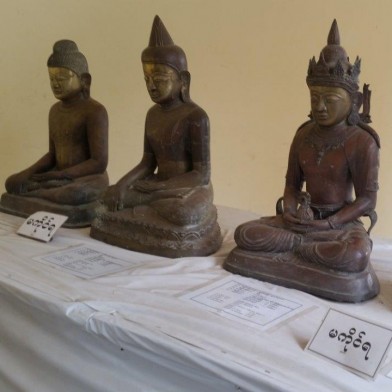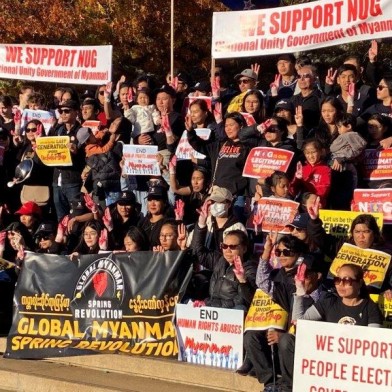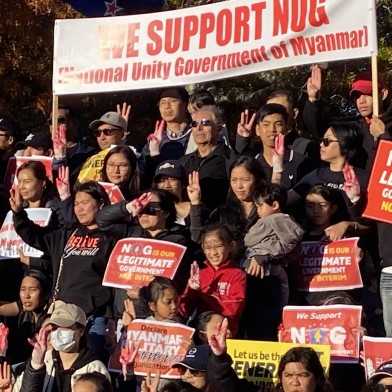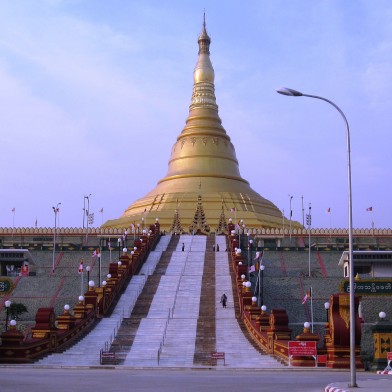When the military junta in Myanmar launched a coup in early 2021, it was met with global outrage and calls for action. But more than two years on, the junta is still in power - how have world leaders responded? And what role can New Zealand play? Stan Jagger has this analysis.
In February 2021, Myanmar’s elected civilian government was deposed by a military coup. The government of Aotearoa New Zealand took initial steps to signal its clear opposition to the military takeover and its brutal suppression of pro-democracy protests. These measures include travel bans on coup leaders, suspension of high-level bilateral political and defence engagement, and ensuring New Zealand’s aid programme did not go through or benefit the junta.
For collective international action alongside other countries and the imposition of specific sanctions and trade restrictions, the United Nations has remained New Zealand’s preferred forum for a multilateral response to the crisis.
However, due to the veto powers of the five permanent members of the UN Security Council, which includes Russia and China, the UN has been largely ineffective in Myanmar. New Zealand supported a June 2021 UN General Assembly resolution that called for a halt to arms sales to Myanmar, but it was non-binding. In November 2022, the UN Security Council passed its first-ever resolution on Myanmar, but for Russia and China to allow it to pass (via their abstentions), no binding measures such as an embargo on arms sales were included.
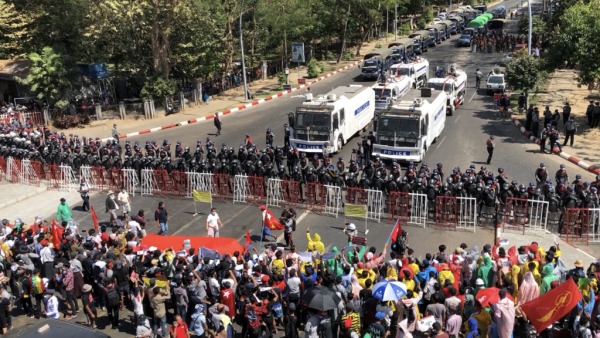
Demonstrators denounce the February military coup in Myanmar. Image: Wikimedia Commons
The resolution deferred to the regional Association of Southeast Asian Nations (ASEAN) and its plan to bring a solution to the crisis. The Five Point Consensus plan was agreed on in April 2021 at a meeting of ASEAN leaders and military junta leader, Senior General Min Aung Hlaing.
The plan called for an immediate end to violence, constructive dialogue with all parties, provision of humanitarian assistance, an ASEAN envoy to facilitate dialogue, and a visit to Myanmar by the envoy. The junta has consistently ignored the plan and instead intensified its brutal war against its own population in an attempt to crush widespread resistance to its rule.
The lack of progress by the UN and ASEAN has not been helped by some ongoing UN and ASEAN engagement with junta officials that is exploited for propaganda purposes by the junta, much to the frustration of the democratic opposition.
Additionally, most of Myanmar’s immediate neighbours, including China, India and Thailand, have maintained relations to varying extents with the junta since the coup.
The US, UK, EU and some other countries have applied sanctions on the junta and military-owned companies, and imposed bans on the supply of weapons, finance and aviation fuel.
However, these measures have not been entirely effective or coordinated. The International Consortium of Investigative Journalists recently revealed, that despite the imposition of sanctions by the EU, US and UK, the trade in Myanmar teak continues to financially benefit the junta as well as contributing to ongoing deforestation. Companies across Europe, North America, and even New Zealand, have imported teak since the sanctions were introduced.
The state-owned Myanmar Oil and Gas Enterprise (MOGE) supplies the junta with much of its foreign currency via foreign investment in offshore gas reserves. It presents the most significant example of the lack of sanctions coordination. While the EU has sanctioned MOGE, the US, UK , Australia and Canada are yet to do so.
The failure of the international response to Myanmar is often compared by Myanmar activists with the strong response from the EU, US and UK to Russia’s invasion and war in Ukraine since February 2022. In that case, a wide range of sanctions have been imposed on Russia and humanitarian aid and weaponry has been provided to Ukraine.
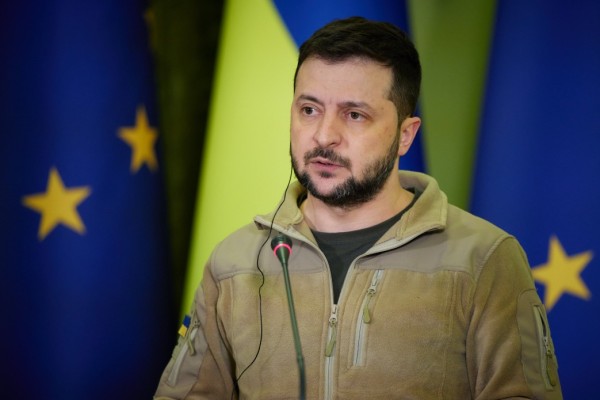
President of Ukraine Volodymyr Zelenskyy. Ukraine has received humanitarian aid after Russia invaded in early 2022. Image: Wikimedia Commons
To sanction people and companies involved in Russia’s invasion of Ukraine, in line with its Western allies, the New Zealand government quickly passed the Russia Sanctions Act. This has opened up the question of New Zealand eventually developing its own autonomous sanctions regime to respond with its own sanctions to crises, such as in Myanmar.
While the situation in Ukraine is viewed as a clear violation of the UN Charter and international law, events in Myanmar are seen as a civil war. Consequently, the popularly supported democratic opposition National Unity Government (NUG), consisting of members of the elected civilian government, civil society activists, people’s defence forces, some ethnic resistance organisations and their associated welfare providers, receive little international aid or support.
Members of the Myanmar community resident in New Zealand have advocated for more practical action from the New Zealand government, including petitions to take in 1000 Myanmar refugees who have family already living here, and for New Zealand to formally recognise the NUG and support the NUG’s representative to continue in Myanmar’s seat at the UN. There has been a sense of frustration that the plight of Myanmar has received considerably less attention than events in Ukraine.
Despite the UN impasse and little progress through ASEAN, there are some recent international developments with implications for ways New Zealand, in coordination with other countries, could take further action to deny the Myanmar junta’s access to finance, weapons and fuel, and also enable more effective humanitarian assistance to people in the country.
In December 2022, the US Congress passed the BURMA Act as part of the National Defence Authorization Act. It enables the US government to provide humanitarian assistance and other ‘non-lethal support’ to the NUG and associated resistance movements.
This development may encourage like-minded countries, including New Zealand, to engage further with the NUG and to provide humanitarian assistance through other non-junta channels. New Zealand has stated that its aid funding does not go through the junta. Instead, its contribution to funding aid to Myanmar is through the UN and ASEAN.
However, UN agencies and ASEAN will still have to negotiate for access and work through the junta which routinely blocks assistance reaching the majority of displaced people in areas outside its direct control. New Zealand could advocate, including through regional meetings it attends within ASEAN, for a more effective ASEAN response, especially now that Indonesia, which has taken a stronger stance on the coup in Myanmar, is the chair of ASEAN for 2023.
Neighbouring Thailand shares a 2,400 km border with Myanmar. An election is scheduled there for May this year. A possible change of ruling parties may allow for some flexibility on the ground in terms of cross-border assistance, even if policy at the elite level towards Myanmar may remain similar. New Zealand working with other supportive states such as the US, Australia, South Korea, and Japan, and some within ASEAN, like Malaysia and Indonesia, could encourage Thailand to tolerate more cross-border humanitarian assistance to displaced people in Myanmar.
With over 1 million people internally displaced, nearly half the country’s population falling below the poverty line, and aid blocked to areas outside junta control, delivery of humanitarian aid is vital.
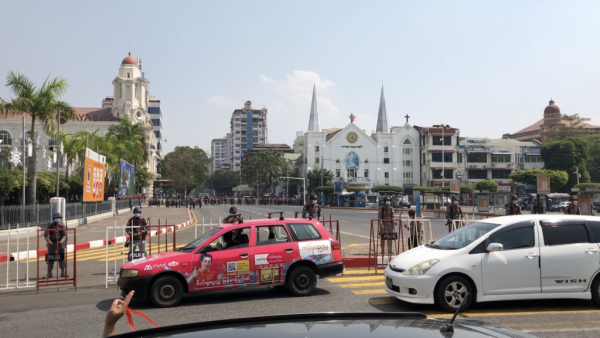
Soldiers at a roadblock in central Yangon during February 2021. Image: Wikimedia Commons
In the absence of a binding UN embargo on export of arms to the Myanmar military, New Zealand alongside other like-minded countries can still work to restrict the supply and transport of material and technology used to produce small arms by the junta’s own weapons factories.
Most of the rifles, machine guns, mines and grenades used by the Myanmar military to deadly effect against its own people are produced domestically. The manufacture of these arms still requires resources, spare parts, machinery, components and transfer of technologies from companies based outside Myanmar.
Recent reports by activist groups reveal that while some of this material and technology comes from China and Russia, companies based in other countries including some aligned more with ‘the West’, such as Singapore, South Korea, Taiwan or Ukraine, have also supplied arms manufacturing material and technology to the junta. These countries are more likely to pay attention to this issue if some international pressure is brought to bear on their companies that have supplied material and technology to the Myanmar military.
In a similar vein, the supply of imported aviation fuel to the junta is central to its continuing use of fighter jets and helicopter gunships. The military has relied more on airpower over the last year as it has faced increased resistance from opposition forces on the ground.
The supply chains and financial services for the junta to access aviation fuel includes companies and ports across different countries including India, Singapore and Thailand. As with the supply of material and technology for domestic arms production, these companies and the countries they are based in could be subject to more international pressure to prevent the supply of aviation fuel to the junta.
New Zealand will likely continue advocating through the UN for an embargo on the sale of weapons and aviation fuel to the junta and the implementation of the ASEAN Five Point plan.
However, there is still more New Zealand can do in cooperation with like-minded countries to assist the people of Myanmar and reduce the military junta’s ability to wage war on them. If at all possible, these options should be considered.
Banner image: Protestors under Aung San Suu Kyi banner at Hledan Yangon during the 2021 coup. Image: Wikimedia Commons
The views expressed are those of the author
- Asia Media Centre
